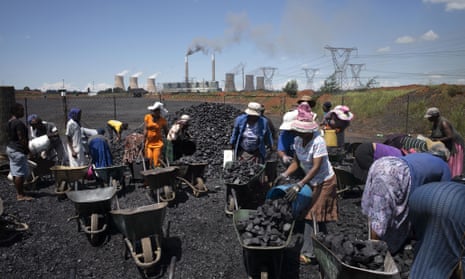The World Bank increased its financing for fossil fuel projects in the last financial year, according to a new analysis, despite repeated calls by its president to end the global subsidies for oil, coal and gas.
In a report released on Friday, Oil Change International (OCI) identified $3.4bn (£2.3bn) of loans, grants, guarantees, risk management and equity for fossil fuel-related projects in the developing world in the 2013-14 financial year. This was the highest recorded in four years and up 23% on the year before although the bank said it disagreed with lumping in both direct and indirect funding.
On Monday, the bank’s president Jim Yong Kim told the Guardian “we need to get rid of fossil fuel subsidies now”, echoing his previous comments on such “harmful” subsidies. The World Trade organisation’s definition of a subsidy is a “financial contribution by a government or any public body”, including loans and loan guarantees.
Stephen Kretzmann, the executive director of OCI, said: “Bank staff are absolutely right to be concerned about fossil fuel subsidies, but they need to get their own house in order as well. They provided more than $3bn in financing for fossil fuels last year, all of which are clearly subsidies for fossil fuel production. The World Bank should lead by example, not try to hide business as usual.”
A World Bank spokeswoman said: “We have seen the [OCI] report and do not agree with the way it characterises our work. Critically, the report uses a completely different way of classifying energy projects to the World Bank Group.”
The spokeswoman said the bank’s own assessment showed its support for fossil fuels almost halved during 2013/14, while its financing of renewable energy rose significantly.
But the bank admitted that its fossil fuel calculation did not include another tranche of funding for governance, called ‘policy and institutional development’ - part of which supports the burning of fossil fuels.
“In countries that produce hydrocarbons, these need to be considered as part of the overall energy strategy. In countries where natural gas is available, the development of this resource often provides a critical alternative to coal-fired power generation,” said the spokeswoman, who added that gas was a “clean flexible fuel”. The bank did not provide an estimate of how much it had put towards the fossil fuel industry through this type of funding.
Sasanka Thilakasiri, who advises Oxfam International on economic justice issues, said:“If the World Bank is suggesting that they are investing in fossil fuels via loop holes, this flies in the face of the good things they have been saying in moving towards a low-carbon economy. The World Bank needs to close this loop hole.”
“Any sort of lending from public institutions, including the World Bank, is a subsidy,” said BankWatch campaigns director Petr Hlobil, who monitors global financing of fossil fuels. “This is the hypocrisy within the institution.”
The World Bank’s data for 2013-14 shows its fossil fuel funding fell to $1.3bn. At the same time its policy and institutional support more than trebled to $1.6bn.
OCI said a $19.8m project in Ghana for “oil and gas capacity building” and one in Mozambique that provided $24.2m to improve the management of coal, oil and gas extraction were examples of finance that could be categorised as policy funding, but facilitated the burning of more fossil fuels.
In addition, OCI said it was its view that projects to build transmission lines to carry fossil fuel-generated electricity still constituted support for fossil fuels.
“A lot of World Bank support goes to supporting the infrastructure around the fossil fuel industry, not just generation itself,” said Petra Kjell, environment programme manager at the Bretton Woods Project (BWP), who said the OCI report was consistent with BWP’s previous research into the bank’s patronage of the fossil fuel industry.
The bank disputed the claim that financing for transmission was support for fossil fuels. “A significant proportion of bank transmission/distribution financing is used to rehabilitate and upgrade inefficient old grids – improving overall emissions,” said the spokeswoman.
Kim has also been a strong advocate for a carbon price. In January at Davos he said “governments must put a price on pollution”. Financial analysts, including Mark Carney the governor of the Bank of England, have warned that a carbon price will render many fossil fuel reserves valueless. Kim himself has described the “systemic risk associated with carbon-intensive activities”.
Yet OCI found the bank had put $643m into projects that contained some element of fossil fuel exploration during 2013-14.
The bank’s spokeswoman said: “In some developing countries renewable costs and lack of base load alternatives mean that fossil fuels will remain part of the energy mix. We won’t solve the climate challenge by targeting energy use in least developed countries. The focus should be on the biggest emitters.”
The discovery of new reserves in developing countries traps them into an economic model that would be incompatible with a working carbon tax, said Shelagh Whitley, a research fellow at the Overseas Development Institute.
“The World Bank actively shapes energy policies in developing countries and should be backing green and low carbon energy. Instead, the direction of its financial support risks locking the poorest countries into outdated economic models powered by dirty fuels. We could end up with parallel worlds of sustainable, clean energy for the rich and dead-end polluting power for the poor,” she said.

Comments (…)
Sign in or create your Guardian account to join the discussion